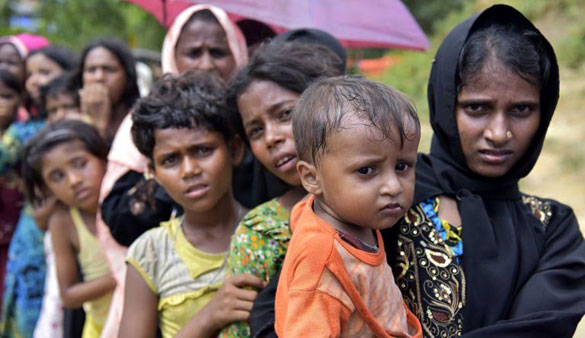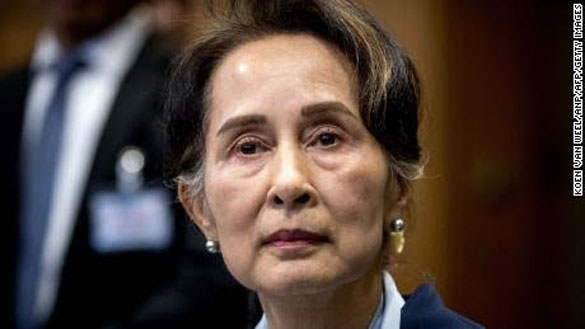
By S. Arshad, New Age Islam
10 November 2020
The second general elections of Myanmar after 2015 have given a clear victory to Aung San Suu Kyi's party National League for Democracy (NLD) but the elections and its results have no meaning for 1.6 million Rohingya Muslims who have been disenfranchised and were barred from participating in November 8 voting. Presently, 1.1 million Rohingyas are lodged in refugee camps in Bangladesh while another half million Rohingya Muslims are living in the Rakhine state where other ethic minorities have been fighting against the NLD government and the army.

Rohingya refugees/Photo courtesy Oulitzee Center
-----
Not only Rohingya Muslims but also other ethnic minorities in Rakhine and Shan states have been disenfranchised on the grounds of the ongoing fight between the Myanmar army the Arakan Army. The Arakan National Party represents the ethnic minority of Rakhine state and has been fighting for autonomy for the Rakhine region.
Aung San Suu Kyi's party NLD is very weak in the region and she knew that if elections were held in this state, her party will lose and Arakan National Party will emerge as a dominant political force and the movement for Rakhine's autonomy will get more strength. Therefore, at the pretext of insurgency and disturbance in the region the government and the Union Election Commission cancelled the elections in Rakhine and some other parts of the country where ethnic minorities are in majority to ensure victory for her party and weaken the opposition.
Rohingya Muslims of Rakhine state have already been disenfranchised and their political leaders were barred from contesting the elections. Therefore, the Democracy and Human Rights Party, a political party representing the Rohingyas was not allowed to contest the elections.

Aung San Suu Kyi/ Photo Courtesy CNN World
-----
Though the opposition and the military had suggested that in view of a surge in Covid-19 cases and the intensified insurgency in the country, the elections should be deferred but the Suu Kyi government went ahead with the polls after cancelling elections in the insurgency-hit regions.
But the political analysts are of the opinion that by disenfranchising the ethnic minorities of Rakhine and Shan states, the government has further alienated the minorities of Rakhine and the people of the region will become more hostile towards Suu Kyi's government. But the Suu Kyi is riding high on popularity wave and so does not care for any criticism.
The 2020 elections have come in for criticism from the UN and Human Rights Watch for being not transparent and for the non-inclusion of ethnic minorities in the voting process. About 4.5% of the total voters have not been able to use their voting rights. This is a very serious issue which has been noticed by the world bodies.
Human Rights Watch has termed the elections as "fundamentally flawed" and denounced the Suu Kyi government for depriving the Rohingyas of their voting rights.
UN Special Investigator in Myanmar Thomas Andrews expressed concerns over non-participation of Rohingyas in the elections. He had earlier said that without the participation of Rohingyas, the elections could not be considered free and fair.
The UN Secretary General Antonio Gutierrez has expressed hope that the new government would allow Rohingyas to return to Myanmar with safety and dignity. But giving the mandate of the majority Barmars (majority Buddhist community) to Suu Kyi's anti-Rohingya policies, it seems a far cry.
The Rohingyas trapped in the refugee camps in Bangladesh have watched the Myanmar elections with frustration and despair. They had pinned their hopes on the Nobel Laureate Aung San Suu Kyi who had come to power with a landslide victory in the first elections in 2015 but her connivance with the army in the genocide of the Rohingyas in 2017 shattered all their hopes.
Although she had come to power with the promise of change and peace, she did not do much for change, her critics observe. On the contrary, she played at the hands of the Army which has 25% reserved seats for it in the Myanmar legislature and has the power to veto any bill for constitutional changes in the country. Instead of taking reconciliatory steps to woo the rebel ethic communities, the Suu Kyi has further alienated by disenfranchising them. She only cares for the majority community and the army. She won the support of the majority Buddhist community and the army by defending the army and the majority Buddhist community against the accusations of genocide of Rohingyas in the International Court of Justice in December last year.
On the whole, the new government led by Aung San Suu Kyi will hold little promise for the ethnic minorities particularly the Rohingyas of Myanmar.
New Age Islam, Islam Online, Islamic Website, African Muslim News, Arab World News, South Asia News, Indian Muslim News, World Muslim News, Women in Islam, Islamic Feminism, Arab Women, Women In Arab, Islamophobia in America, Muslim Women in West, Islam Women and Feminism

No comments:
Post a Comment